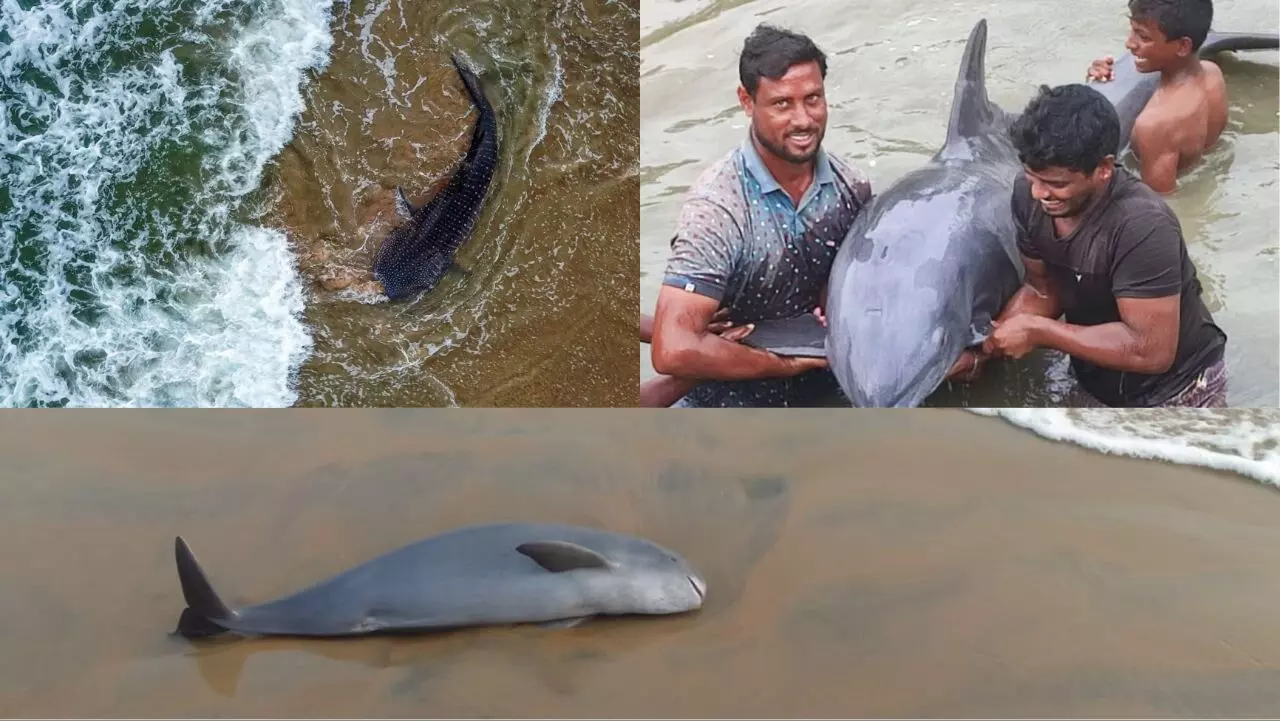Human interference causing frequent dolphin, whale shark strandings in AP beaches
According to environmentalists, January and February are the seasons when dolphins come close to the shoreline and hunt for fish when the sea is calm.
By Sri Lakshmi Muttevi
Kakinada: In the last few years, whale sharks, porpoises, humpback whales, and spinner dolphins have been frequently spotted in the Bay of Bengal, Andhra Pradesh. While some of these animals were stranded on the coast and successfully rescued by fishermen, a few were found dead. According to reports, in the last one year, four dolphins were rescued and sent back to the waters while three died. Human interference and mechanised trawlers are among the major causes of unfavorable conditions for dolphins.
One such incident was reported on 3 February when a Bottlenose Dolphin, which was believed to be stranded in the Buckingham Canal after it entered from the sea, was found dead allegedly due to unfavorable conditions near the Kakinada coast. On 2 February, locals sighted the stranded male dolphin in the canal at Pedapudi village near Kakinada and alerted the forest department.
After a day, it was found dead a few metres away from where it was sighted. A preliminary investigation suggested that the dolphin could not cope with the canal’s freshwater environment. The forest, revenue, and veterinary staff retrieved the carcass, conducted a post-mortem, and later, buried it in the Godavari estuary.
Human interference
According to environmentalists, January and February are the seasons when dolphins come close to the shoreline and hunt for fish when the sea is calm. One of the prime reasons is disturbance due to coastal areas and human interference.
While dolphins come to hunt fish on the shorelines, they are clever and can escape from the fishing nets, but in some cases, they get trapped. Most fishermen inform the officials who launch rescue operations to push them back into the sea. Fishermen are educated about this issue, but in rare cases, the fishermen take advantage of the stranded dolphins and kill them.
“Dolphins live in the sea, but in recent years, we have seen them in coastal waters. While the fishermen community is educated on avoiding their deaths, the common man feels it is a rare mammal and they don’t think about the animal. The dolphins get stressed when they see humans,” said an environmentalist.
“In the recent death of the dolphin on the Kakinada coast, while the dolphin was spotted by the fishermen who immediately informed the authorities, the local youth who went into the water caught hold of the dolphin and took photos. Such human activities stress the mammals and make the conditions unfavorable,” said an environmentalist on condition of anonymity.
Dolphin spotting since 2021
Since 2021, the fishermen in the state have noticed an increase in whale shark and dolphin sightings along the Andhra coast. According to the fishermen, until 2007, whale shark was a rare visitor to the coastal Andhra region, but in recent years, they have been spotting many.
· Earlier, a video circulated on social media of dolphins being spotted on the Rushikonda beach by kayakers.
· In October 2022, a stranded young Bottlenose dolphin was successfully pushed back out to sea on Andhra’s Yekavuru beach.
· In February 2022, a fisherman spotted a whale shark (Rhincodon typus, a shark species, the largest shark species listed as ‘Endangered’ by the International Union for Conservation of Nature). A team consisting of 40 local fishermen, along with Srikanth Mannepuri, photographer and wildlife conservationist from Kakinada, successfully pushed the whale shark to the sea after untangling it from the fishing net.
· In November 2021, a Risso’s Dolphin, Grampus griseus, which measured 230 cm in length, was stranded on the Rushikonda beach, Visakhapatnam.
· In September 2021, a short-beaked common dolphin (Delphinus capensis Gray 1828) was washed ashore at Kambalarayudupeta, Srikakulam, while a Humpback dolphin was washed ashore at the Vizag beach.
· In April 2021, a Humpback dolphin was washed ashore at Sagarnagar and Rushikonda beach.
Study to identify hotspots
In June 2022, researchers from the Wildlife Institute of India (WII), Wildlife Conservation Society India, and the National Oceanic and Atmospheric Administration (USA) studied the stranding pattern and identified places where these mammals were frequently spotted. The project was funded by the National CAMPA Advisory Council (NCAC), Union ministry of environment, forest and climate change. Their research discovered trends for hotspots in particular coastal areas like the northern Karnataka coast, south of Kerala, Tamil Nadu, and Visakhapatnam. They also found that stranding events have increased over recent years, particularly between 2015–2017.
Study on conservation
In a study conducted by ICAR-Central Marine Fisheries Research Institute in 2015, it was observed that gill nets are responsible for 98.8% of the mortalities and occasional reports of incidental catch/entanglement in trawl, purse seine, shore seine, and longline have also been recorded since the 1970s. From 1976 to 2013, about 766 entanglements/incidental catches of dolphins in fishing gear have been reported in Karnataka, Kerala, Tamil Nadu, and Andhra Pradesh.